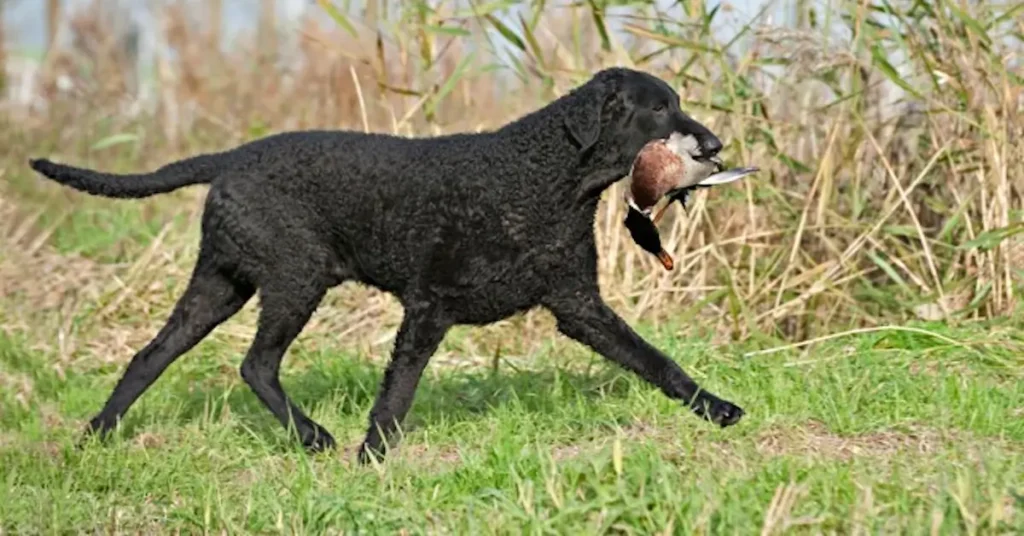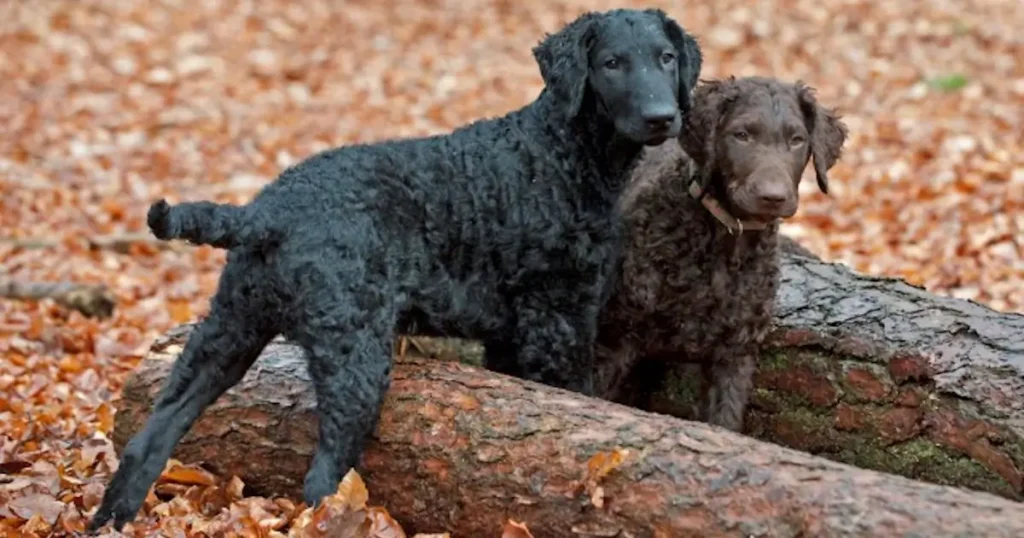Imagine you’ve stepped out of a time machine, greeted not by the expected dinosaurs or futuristic androids, but by the eager eyes of a Curly-Coated Retriever, a breed as classic as it is distinctive. You’re about to discover the unique characteristics that set this breed apart, from their tightly wound curls to their keen intelligence.
As one of the oldest retriever breeds, these dogs are not just pretty faces; they possess a versatile skill set that has stood the test of time, whether in the field, on the show ring, or curled up by the fireside of a loving home. While you might be intrigued by their luscious locks, their personality and the care they require might capture your heart.
But before you consider if this breed is the right companion for you, understand that beneath those curls lies a story of breed evolution, purpose, and the kind of loyalty that might just redefine your idea of a four-legged friend.
- Noise Level
- Energy
- Sociability
- Trainability
- Care
- Health
Overall
Summary
The Curly-Coated Retriever is moderately vocal, highly energetic, sociable, moderately trainable, requires moderate care, and typically enjoys good health.
Curly-Coated Retriever: Traits, Temperament, and Care Guide
A distinctive water-resistant coat distinguishes the Curly-Coated Retriever and exhibits high intelligence, marked independence, and a keen ability to adapt to various tasks and environments. Its unique coat of tight curls requires minimal grooming.
Prioritize early socialization and daily exercise to mitigate potential health problems. Obedience training is essential, reinforcing their natural aptitude while fostering a sense of belonging.
Exploring the Characteristics of the Curly-Coated Retriever
Having explored the general traits and care guide for the Curly-Coated Retriever, let’s examine the specific physical attributes and behavioral tendencies that set this breed apart.
| Trait | Details | Emotional Appeal |
|---|---|---|
| Unique Curly Coat | Water-resistant, tight curls provide insulation. | Sense of pride in distinctiveness. |
| Origin | Originated in England, versatile hunting dog. | Connection to a rich history. |
| Temperament | Intelligent, independent, good family companion. | Fulfillment from deep bonds. |
Curly-Coated Retriever: A Comprehensive Profile and Guide
In examining the Curly-Coated Retriever, you’ll find a breed whose origins in game retrieval are evident in its physical and behavioral traits. This breed’s distinctive coat isn’t just for show; it’s a functional trait evolved for protection in water and brush, requiring careful maintenance.
Assessing their capabilities, you’ll discover a versatile dog adept in various roles, from fieldwork to therapy, highlighting a need for diverse training and socialization strategies.
Everything You Need to Know About
Dive into the comprehensive profile of Curly-Coated Retrievers, a breed distinguished by its unique curls and versatile working capabilities, to understand what makes them exceptional companions and skilled working dogs.
- Coat care: Regular grooming ensures your Curly Coated Retriever puppy’s coat remains in prime condition.
- Dog training: Invest in early, consistent dog training for well-rounded behavior.
- Exercise needs: Provide ample exercise and mental stimulation to prevent boredom.
- Health watch: Be vigilant for health issues like hip dysplasia and consider guidance from American Kennel-endorsed Retriever breeders.
Discovering the Temperament
When considering a Curly-Coated Retriever as a pet, it’s essential to understand that their temperament combines sassiness and independence with a strong desire to please, demanding a committed approach to their social and mental needs.
As intelligent dogs, Retrievers thrive with families and bond deeply. Training is crucial; these Dogs need lots of stimulation to avoid boredom.
Their alert, watchful nature pairs well with children, ensuring a protective, yet affectionate companion.

Curly-Coated Retriever: Is It a Good Fit for Families?
As you consider a Curly-Coated Retriever for your family, it’s crucial to evaluate their compatibility with children and household dynamics.
Their inherent loyalty and intelligence make them excellent companions, yet they require consistent exercise and mental engagement to thrive.
Moreover, their protective instincts and adaptability in social settings warrant comprehensive training to foster a well-rounded family pet.
Assessing Curly-Coated Retriever’s Compatibility with Families and Kids
Considering a Curly-Coated Retriever for your family? You’ll find that this breed’s affectionate and loyal nature typically makes them excellent companions for both children and adults.
- Comparable to family dogs like Labrador and Golden Retrievers, they bond deeply with their human family.
- Similar to the Irish Water Spaniel, they’re energetic, suiting an active family.
- Known to get along well with adults and children alike.
- With socialization, they can become a child’s best friend.
Curly’s Versatile Living Environments
Despite their robust and curly coat, Curly-Coated Retrievers adapt well to various living environments, from compact urban apartments to expansive rural homes with large yards.
As sporting dogs with English Water dog lineage, they’re versatile across the United States. Thriving with enough exercise, they’re suited for apartment living, given ample outdoor activities.
This water dog’s adaptability ensures a sense of belonging in diverse habitats.
Curly’s Obedience Training Tips
As you initiate obedience training with your Curly-Coated Retriever, leveraging their innate intelligence and problem-solving skills is crucial. You’ll need to employ positive reinforcement techniques consistently to maintain their attention and foster a willingness to learn.
Integrated mental challenges and ample physical activity into the training regimen will mitigate boredom and enhance participants’ focus during sessions.
Effective Training Strategies
To effectively train a Curly-Coated Retriever, leveraging their high intelligence is crucial by incorporating training exercises that challenge their cognitive abilities.
| Strategy | Benefit |
|---|---|
| Early Socialization (@ 8 weeks) | Fosters confidence; Retriever Club of America norms |
| Consistent Leadership | Curbs willfulness; fosters a confident owner |
| Regular Retrieving Game | Sharpens instincts; preps for field trials |
Prioritize effective training strategies for vigorous exercise and adaptability.
Exercise and Grooming Needs
When considering the Curly-Coated Retriever, providing at least 40 minutes of daily exercise is essential to accommodate their high energy levels and maintain their mental and physical well-being.
Their distinctive curly coat doesn’t shed excessively but does need regular grooming to prevent mats.
As your first dog, you’ll find they eagerly retrieve game and thrive with activities fulfilling their grooming needs and exercise regimen.

Health Considerations
As you consider a Curly-Coated Retriever as your companion, it’s crucial to understand the breed’s susceptibility to certain genetic conditions. You’ll need to monitor for signs of hip and elbow dysplasia, Glycogen Storage Disease, and eye problems, such as Progressive Retinal Atrophy, which can impact your dog’s quality of life.
Preventive measures include regular health evaluations and a tailored diet, imperative for mitigating risks and prolonging your pet’s lifespan.
Common Health Issues and Lifespan
Curly-Coated Retrievers often face health challenges such as Elbow and Hip Dysplasia, Glycogen Storage Disease (GSD IIIa), various eye problems, Gastric Dilatation-Volvulus (GDV or Bloat), and a predisposition to certain cancers, influencing their lifespan that typically ranges from 10 to 12 years.
To safeguard their health, prioritize recommended evaluations and a tailored diet. When you greet new pups, verify breeder responsibility, including genetic testing.
Curly-Coated Retriever: A Waterfowl Hunter’s Ideal Partner
Like its retriever relatives, the Curly-Coated Retriever excels in waterfowl hunting and is prized for its intelligence and endurance.
| Similar Dogs | Short Description |
|---|---|
| Labrador Retriever | A popular breed known for its friendliness, intelligence, and retrieving skills. |
| Golden Retriever | Famed for its gentle temperament and adeptness in retrieval both on land and water. |
| Chesapeake Bay Retriever | A strong and hardy breed, excellent in hunting and retrieving in challenging conditions. |
| Flat-Coated Retriever | Known for its luscious coat and upbeat disposition, excellent in retrieving. |
| Nova Scotia Duck Tolling Retriever | A breed known for its playful nature and unique technique in luring waterfowl. |
Is Curly-Coated Retriever the Right Pet for You?
Determining whether a Curly-Coated Retriever suits your lifestyle requires careful consideration of their need for regular exercise, mental engagement, and an owner who respects their independent nature.
As one of the best dog breeds for active family members, this breed isn’t typically suitable for apartment living or being left alone for long periods.
Whether you choose a puppy or adult dog, remember they’re not a cross between a poodle and Labrador retrievers.
Conclusion
In the tapestry of canine companions, the Curly-Coated Retriever stands out. It is a living mosaic of robust and refined traits.
Like an expertly woven fabric, their characteristic curls require meticulous care, reflecting the devotion of those who cherish them.
Your journey with a Curly is an odyssey of shared growth, each twist in their coat paralleling the complexities of their spirit.
Choose this breed, and you choose a multifaceted companion, as intricate and rewarding as nature.
Frequently Asked Questions
What Are Some Interesting Facts About Curly Coated Retrievers?
You’re exploring curly history, where water affinity and distinctive curls define a breed. With a gentle temperament, they’re great hunting companions. Consider maintenance tips for shedding patterns, and don’t overlook their exercise needs.
What Was the Original Purpose of the Curly Coated Retriever?
The Curly-Coated Retriever’s original purpose was game retrieving, particularly waterfowl hunting, where their dense curls, strong swimming ability, and historical origins as versatile workers in marshy terrain made them an exemplary sporting breed.
Are Curly Coated Retrievers Rare?
Curly Rarity isn’t extreme; breed popularity’s moderate. Your research on genetic uniqueness must consider preservation efforts. International presence varies; show ring appearances and breeding challenges affect adoption availability. Seek community for belonging.
Are Curly Coated Retrievers Smart?
Yes, Curly-Coated Retrievers excel in intelligence comparisons, showing swift learning speed and exceptional problem-solving abilities. They thrive on mental stimulation and obedience training, reflecting their high canine IQ and adaptive intelligence.
